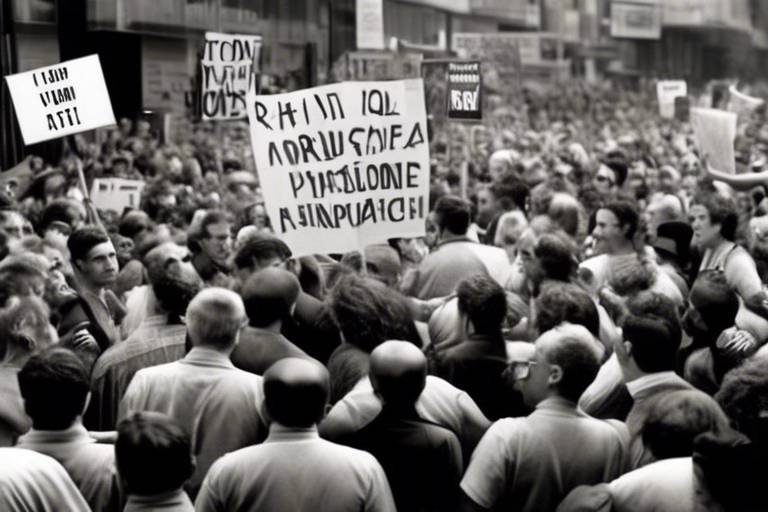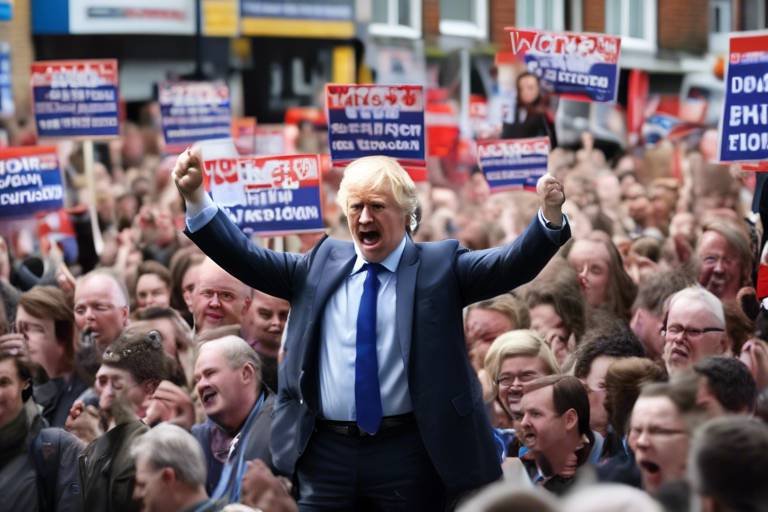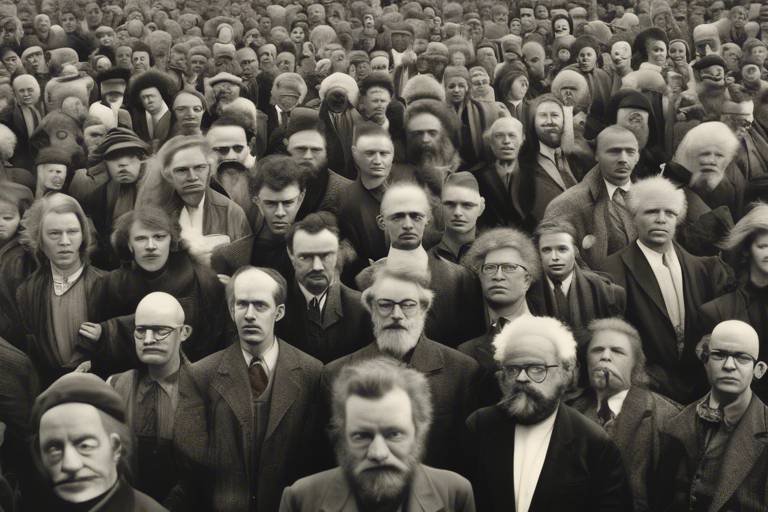Philosophy and the Debate on Capital Punishment
Capital punishment is one of those issues that sparks heated debates, often dividing opinions sharply. At its core, the debate revolves around profound philosophical questions about justice, morality, and the role of the state in administering punishment. As we delve into this topic, we encounter a myriad of ethical frameworks that shape our understanding of capital punishment. Each framework offers a unique lens through which we can examine the implications of the death penalty, raising questions about its morality, effectiveness, and societal impact.
To start, let’s explore the ethical frameworks that underpin the arguments for and against capital punishment. Utilitarianism, for instance, evaluates the morality of an action based on its consequences. Proponents of capital punishment might argue that it serves the greater good by deterring crime and ensuring public safety. However, critics counter that the death penalty does not effectively deter crime and that the potential for wrongful executions undermines its utilitarian justification.
On the other hand, deontological ethics emphasizes the inherent morality of actions rather than their outcomes. From this perspective, capital punishment may be viewed as inherently wrong, regardless of its potential benefits. The idea that taking a life is morally unacceptable resonates strongly with many who advocate for the abolition of the death penalty. This ethical stance raises critical questions about human rights and the sanctity of life, challenging us to consider whether the state should ever have the power to execute its citizens.
Then we have virtue ethics, which focuses on the character and intentions of the moral agent rather than specific actions or consequences. Advocates of this framework might argue that a just society should cultivate virtues such as compassion and forgiveness, suggesting that capital punishment runs counter to these ideals. In this way, the debate on capital punishment is not merely about legality or public safety; it’s also about the kind of society we aspire to be.
As we navigate these philosophical waters, it becomes clear that the discourse surrounding capital punishment is deeply complex and multifaceted. Each ethical framework invites us to reflect on our values and the implications of our collective choices. The question remains: can we reconcile the desire for justice with the moral imperatives that challenge the very foundation of capital punishment? This is the crux of the debate, and it is one that demands careful consideration and open dialogue.
In the following sections, we will delve deeper into the historical perspectives that have shaped capital punishment and examine contemporary arguments that continue to fuel this contentious issue. By understanding the past and present of capital punishment, we can better navigate the philosophical debates that lie ahead.
- What is capital punishment? Capital punishment, also known as the death penalty, is the state-sanctioned execution of an individual as punishment for a crime.
- What are the main arguments for capital punishment? Proponents argue that it serves as a deterrent to crime, provides justice for victims, and removes dangerous individuals from society.
- What are the main arguments against capital punishment? Critics highlight the risk of wrongful convictions, the lack of evidence for its deterrent effect, and moral objections to taking a life.
- How does capital punishment vary around the world? The application of capital punishment varies significantly, with some countries abolishing it entirely while others continue to use it extensively.

The Ethical Frameworks
When diving into the murky waters of capital punishment, it's essential to anchor our discussion in the various ethical frameworks that shape our understanding of this issue. Different ethical theories provide distinct lenses through which we can examine the morality of the death penalty, each bringing its own set of principles and values to the table. Let's explore three prominent frameworks: utilitarianism, deontology, and virtue ethics.
Utilitarianism is grounded in the idea that the best action is the one that maximizes overall happiness or utility. From this perspective, proponents of capital punishment might argue that executing a criminal serves the greater good by deterring future crimes and providing a sense of justice to society. However, critics of this view point out that the death penalty may not effectively deter crime, thereby questioning whether it truly contributes to the overall happiness of society. The utilitarian calculus becomes even more complex when considering the potential for wrongful executions, which can cause immense suffering not only to the innocent individuals involved but also to their families and communities.
On the other hand, deontology offers a different take. This ethical theory, primarily associated with the philosopher Immanuel Kant, emphasizes the importance of duty and moral rules over the consequences of actions. Deontologists argue that capital punishment is inherently wrong, regardless of its outcomes, because it violates the moral imperative to treat individuals with dignity and respect. They believe that every human life has intrinsic value, and that taking a life, even of someone who has committed heinous acts, is a violation of that fundamental principle. This creates a significant tension in the debate, as it raises the question: can a society that practices capital punishment genuinely claim to uphold the values of justice and morality?
Lastly, we have virtue ethics, which focuses on the character and intentions of the moral agent rather than the actions themselves or their consequences. Virtue ethicists might ask what kind of society we want to cultivate and whether endorsing the death penalty aligns with the virtues we aspire to embody, such as compassion, forgiveness, and justice. They may argue that a society that resorts to capital punishment is one that lacks the capacity for rehabilitation and understanding, ultimately failing to promote the moral growth of its citizens. This perspective invites us to reflect on our collective values and the kind of legacy we wish to leave for future generations.
In summary, the debate surrounding capital punishment is not merely a question of whether it is effective or morally justified; it is deeply intertwined with our ethical beliefs and the frameworks we choose to adopt. Each perspective—utilitarianism, deontology, and virtue ethics—offers valuable insights that can help us navigate this complex moral landscape. As we continue to grapple with this issue, it’s crucial to consider not only the implications of our choices but also the ethical foundations upon which they rest.

Historical Perspectives
Understanding the evolution of capital punishment is crucial for grasping its societal implications today. Throughout history, the death penalty has been a contentious issue, with varying practices and philosophies shaping its application. From ancient civilizations to modern societies, the journey of capital punishment reflects the changing values and beliefs surrounding justice, morality, and human rights. Each era brought with it distinct methods and justifications for the death penalty, influenced by cultural, religious, and legal frameworks.
In ancient times, capital punishment was often seen as a necessary tool for maintaining order and deterring crime. For instance, the Code of Hammurabi, dating back to around 1754 BC, established a legal framework in Babylon that included the death penalty for various offenses. This early legal code illustrates how societies justified severe punishments as a means of retribution and social control. Similarly, in ancient Greece, the death penalty was employed for crimes such as murder and treason, reflecting a belief in the need for harsh consequences to uphold societal norms.
Delving deeper into the practices of ancient civilizations reveals a fascinating tapestry of methods and motivations behind capital punishment. In Babylon, for example, the infamous practice of hanging was used, while in Greece, methods varied from stoning to execution by poison, showcasing the cultural attitudes towards justice and retribution. These approaches were not merely punitive; they were also deeply intertwined with the societal values of the time, emphasizing a collective belief in the necessity of capital punishment for maintaining order.
The medieval era marked a significant shift in the codification of capital punishment laws. During this time, the intertwining of feudal systems and religious beliefs profoundly influenced how justice was administered. The Church played a pivotal role, often dictating moral standards and justifications for the death penalty. Executions became public spectacles, intended not only to punish the guilty but to serve as a stark warning to the populace. The infamous hanging, drawing, and quartering method in England exemplifies the brutal nature of medieval justice, designed to instill fear and deter crime.
Fast forward to the 20th century, and we see a burgeoning movement advocating for the abolition of capital punishment. This shift was fueled by a growing recognition of human rights and the fallibility of judicial systems. Influential figures such as Albert Camus and organizations like Amnesty International have played crucial roles in challenging the morality and effectiveness of the death penalty. Landmark events, such as the United Nations' call for a global moratorium on executions, have further highlighted the need for reevaluation of capital punishment in contemporary society. As public opinion shifts, the debate continues to evolve, raising critical questions about justice, morality, and the role of the state in administering the ultimate punishment.

Ancient Practices
When diving into the of capital punishment, one can't help but marvel at the intricate tapestry of justice woven by civilizations long gone. From the formidable empires of Babylon to the philosophical musings of ancient Greece, the methods and motivations behind capital punishment reveal much about the societies that employed them. In these ancient times, the death penalty was not merely a legal consequence; it was a reflection of cultural values, societal norms, and the prevailing notions of justice and morality.
Take, for example, the ancient Babylonians, who codified their laws in the famous Code of Hammurabi. This code, dating back to around 1754 BC, is one of the earliest and most complete written legal codes, and it established a system of strict retribution where the principle of "an eye for an eye" was paramount. The penalties for various crimes were often severe, with capital punishment reserved for the most egregious offenses, such as murder or treason. This approach not only served to punish the offender but also acted as a warning to others, reinforcing the idea that justice must be served without exception.
Similarly, in ancient Greece, the concept of justice was deeply intertwined with the philosophical teachings of the time. Philosophers like Plato and Aristotle debated the morality and efficacy of capital punishment, often questioning whether it truly served the greater good. In Athens, for instance, the death penalty was employed for serious crimes, but the methods varied significantly. Execution could be carried out through methods such as poisoning, stoning, or even exile—a fate considered worse than death by some. This variability highlights the complexity of societal attitudes toward punishment and the quest for a just society.
Moreover, the societal context played a crucial role in shaping these practices. The ancient Romans, for example, used capital punishment as a tool of political control. Executions were public spectacles, designed to instill fear and demonstrate the power of the state. The infamous Crucifixion of Jesus Christ is a poignant example of how capital punishment was wielded not only as a form of justice but also as a means of suppressing dissent and maintaining order. The spectacle of execution served a dual purpose: it punished the individual while simultaneously reinforcing the authority of the ruling class.
In contrast, some ancient societies had more restorative approaches to justice. The indigenous tribes of North America, for example, often sought to restore balance within the community rather than resorting to execution. While some tribes did practice capital punishment, many preferred methods that promoted healing and reconciliation, showcasing a vastly different understanding of justice compared to their Babylonian or Roman counterparts.
As we reflect on these ancient practices, it becomes evident that capital punishment was not a one-size-fits-all solution. Each society adapted its methods and philosophies to fit its unique cultural and ethical landscapes. The evolution of these practices over time raises important questions about the nature of justice and punishment that continue to resonate in today's debates on capital punishment.
- What were the most common methods of execution in ancient civilizations?
Common methods included stoning, crucifixion, hanging, and poisoning, depending on the cultural context and severity of the crime.
- Did ancient societies have any form of legal representation for the accused?
While some societies had rudimentary forms of legal representation, many did not provide the same rights we see in modern legal systems, leading to potential injustices.
- How did public perception of capital punishment evolve in ancient times?
Public perception varied widely; while some viewed it as a necessary measure for maintaining order, others questioned its morality and effectiveness.

Medieval Justice Systems
The medieval era was a time of profound transformation in the realm of justice, particularly concerning the application of capital punishment. During this period, the intertwining of feudal systems and religious beliefs significantly influenced how societies approached the death penalty. The justice systems of medieval Europe were often characterized by a blend of local customs, royal decrees, and ecclesiastical law, creating a complex tapestry of legal practices. In many cases, the ruling class held absolute authority over life and death, and the imposition of capital punishment was a reflection of their power.
One of the most notable features of medieval justice was the reliance on public executions as a means of deterrence. These events were not merely punitive; they were grand spectacles designed to instill fear and reinforce the social order. Imagine a crowd gathered in a town square, witnessing the execution of a convicted criminal. This was not just about punishment; it was a communal event that served to remind everyone of the consequences of defying the law. In this sense, capital punishment was both a tool of justice and a method of social control.
Religious influence played a crucial role in shaping the attitudes toward capital punishment during the medieval period. The Church often sanctioned the death penalty, viewing it as a necessary evil to maintain moral order. This perspective was rooted in the belief that certain crimes were so heinous that they warranted divine retribution. For instance, crimes such as murder, treason, and heresy were frequently met with the harshest penalties, including execution. The Church's involvement in the judicial process led to a unique blend of secular and spiritual authority, complicating the moral landscape of capital punishment.
Moreover, the medieval justice system was marked by its lack of standardization. Different regions had varying laws and methods of execution, which often reflected local customs and societal values. For example, in some areas, hanging was the preferred method of execution, while in others, burning at the stake was deemed more appropriate. This inconsistency raised questions about fairness and justice, as individuals could face drastically different fates for similar crimes depending on where they lived.
To further illustrate the diversity of capital punishment practices during the medieval period, consider the following table that outlines some common methods of execution and their associated crimes:
| Method of Execution | Associated Crimes |
|---|---|
| Hanging | Murder, theft |
| Burning at the Stake | Heresy, witchcraft |
| Beheading | Treason, noble crimes |
| Drawing and Quartering | Treason |
As we delve deeper into the medieval justice system, it becomes clear that capital punishment was not merely a legal matter; it was a reflection of the societal values and power dynamics of the time. The death penalty served as a means to uphold the feudal order, reinforce the authority of the Church, and maintain social cohesion. However, it also raised significant ethical questions that resonate with contemporary debates on the morality and effectiveness of capital punishment. As we explore the evolution of these ideas, it is essential to recognize the historical context that shaped them.
- What were the primary methods of execution in medieval times?
Common methods included hanging, burning at the stake, beheading, and drawing and quartering, each associated with specific crimes. - How did religion influence capital punishment during the medieval era?
The Church often sanctioned capital punishment, viewing it as necessary for maintaining moral order, particularly for heinous crimes. - Was capital punishment consistent across medieval Europe?
No, practices varied significantly by region, reflecting local customs and societal values. - What role did public executions play in medieval society?
Public executions served as a deterrent and a means of social control, reinforcing the consequences of defying the law.

Modern Abolition Movements
The movement to abolish capital punishment has gained significant traction in recent decades, fueled by a combination of ethical considerations, human rights advocacy, and growing public awareness of the flaws within the justice system. Activists argue that the death penalty is not only an ineffective deterrent but also a deeply flawed system that disproportionately affects marginalized communities. This movement has seen various organizations and individuals step forward, each contributing unique perspectives and strategies to the cause.
One of the pivotal organizations in this fight is the American Civil Liberties Union (ACLU), which has tirelessly worked to challenge the legality and morality of capital punishment. Their efforts highlight the potential for wrongful convictions, which can lead to irreversible consequences for innocent lives. In fact, studies have shown that a significant number of death row inmates have been exonerated due to new evidence or flawed legal processes.
In addition to the ACLU, grassroots movements have sprung up across the globe, advocating for reform or complete abolition of the death penalty. For instance, organizations like Amnesty International and Death Penalty Information Center have played crucial roles in raising awareness about the human rights implications of capital punishment. They emphasize that the death penalty often fails to provide justice, instead perpetuating a cycle of violence and retribution. These organizations frequently engage in public campaigns, lobbying efforts, and educational initiatives aimed at shifting public opinion and influencing policymakers.
Moreover, high-profile cases of wrongful executions have ignited public outrage and fueled the abolitionist movement. The stories of individuals like Ruben Cantu and Cameron Todd Willingham, who were executed despite substantial evidence of their innocence, serve as stark reminders of the system's fallibility. These cases have not only galvanized activists but have also prompted lawmakers to reconsider the viability of capital punishment in their jurisdictions.
As a result of these efforts, many countries have either abolished the death penalty or imposed moratoriums on its use. According to Amnesty International, over two-thirds of the world’s countries have eliminated capital punishment in law or practice. This shift reflects a growing recognition that human rights should take precedence over punitive measures. In fact, a recent
| Year | Country | Action Taken |
|---|---|---|
| 2011 | Portugal | Abolished the death penalty |
| 2015 | Fiji | Abolished the death penalty |
| 2020 | California | Governor imposed a moratorium |
| 2021 | Virginia | Abolished the death penalty |
Despite these advancements, the abolitionist movement faces ongoing challenges. In some regions, public support for capital punishment remains strong, often fueled by a desire for justice and retribution. Advocates for the death penalty argue that it serves as a necessary tool for maintaining law and order. However, the abolitionist movement counters this narrative by highlighting the need for comprehensive criminal justice reform that addresses the root causes of crime rather than resorting to extreme punitive measures.
In conclusion, the modern abolition movements are not just about ending capital punishment; they represent a broader struggle for justice, equality, and human rights. As more individuals and organizations rally behind this cause, the hope for a future without the death penalty becomes increasingly attainable.
- What is the main argument against capital punishment? Many argue that it is inhumane, prone to errors, and does not effectively deter crime.
- Which countries have abolished the death penalty? Countries like Portugal, Canada, and many in Europe have abolished capital punishment.
- What are the alternatives to capital punishment? Life imprisonment without parole is often suggested as a humane alternative.

Contemporary Arguments
The debate surrounding capital punishment is as heated as ever, with strong opinions on both sides. Advocates argue that the death penalty serves as a necessary tool for justice, while opponents contend that it is an outdated and inhumane practice. One of the most compelling arguments in favor of capital punishment is the notion of deterrence. Proponents believe that the fear of facing the ultimate punishment will discourage potential criminals from committing heinous acts. They often cite statistics suggesting that states with the death penalty experience lower murder rates. However, it's crucial to question the validity of these claims. Are these statistics truly reflective of a causal relationship, or are they merely coincidental?
On the flip side, opponents of capital punishment argue that there is little empirical evidence to support the idea that it effectively deters crime. In fact, many studies have shown that regions without the death penalty do not necessarily experience higher crime rates. This leads to a significant question: if the death penalty does not act as a deterrent, then what purpose does it serve? This brings us to the concept of retributive justice, which posits that punishment should be proportionate to the crime committed. While some believe that capital punishment fulfills this need for retribution, others argue that it perpetuates a cycle of violence and vengeance, ultimately failing to provide true justice.
Another critical aspect of the contemporary debate revolves around the rights of victims and their families. Many advocates for the death penalty argue that it provides closure to those affected by violent crimes. They believe that executing the perpetrator can help families heal and restore a sense of justice. However, this perspective raises ethical concerns. Is it fair to prioritize the emotional needs of victims’ families over the potential for wrongful convictions? The tragic reality is that the judicial system is not infallible, and innocent lives have been lost due to wrongful executions. This brings us to an essential consideration: the moral implications of a legal system that can potentially end an innocent life.
Moreover, the debate is further complicated by the socio-economic factors that influence capital punishment. Studies have shown that individuals from lower socio-economic backgrounds are disproportionately represented on death row. This raises questions about equity and justice: does the death penalty serve as an equalizer in society, or does it merely reflect the systemic inequalities that exist? The intersection of race, class, and capital punishment cannot be ignored, as it highlights the biases that can pervade judicial outcomes.
In summary, the contemporary arguments surrounding capital punishment are multifaceted and complex. They encompass issues of deterrence, retribution, victim's rights, and socio-economic disparities. Each side presents compelling points, making it essential for society to engage in meaningful dialogue about the future of capital punishment. As we navigate these contentious waters, it is crucial to remain open-minded and consider the broader implications of our justice system.
- What is the main argument for capital punishment? Proponents argue that it serves as a deterrent against serious crimes.
- Are there any studies supporting the effectiveness of capital punishment? Some studies suggest a correlation between the death penalty and lower crime rates, but many experts dispute these findings.
- What are the ethical concerns surrounding capital punishment? Ethical concerns include the potential for wrongful convictions, the disproportionate impact on marginalized communities, and the morality of state-sanctioned killing.
- How do victim's rights factor into the capital punishment debate? Advocates argue that capital punishment provides closure for victims' families, while opponents question if this is a justifiable reason for execution.

Deterrence vs. Retribution
The debate over capital punishment often boils down to two primary concepts: deterrence and retribution. These ideas represent different philosophies about justice and the role of the state in administering punishment. Deterrence suggests that the threat of severe penalties, such as the death penalty, will discourage individuals from committing heinous crimes. On the other hand, retribution focuses on the idea that justice must be served, and that the punishment should fit the crime, often advocating for a death sentence as a form of societal vengeance.
Proponents of deterrence argue that the death penalty serves as a powerful warning to potential criminals. They believe that if individuals know they could face the ultimate punishment for their actions, they may think twice before committing violent crimes. However, critics challenge this notion, pointing to studies that show no conclusive evidence linking capital punishment to lower crime rates. In fact, some argue that states without the death penalty often experience similar or even lower rates of violent crime compared to those that enforce it.
On the other hand, the retributive justice model posits that capital punishment is justified as a means of delivering justice. Advocates argue that for particularly egregious crimes, such as murder, the only appropriate response is to impose a sentence that reflects the severity of the act. They often contend that failing to execute a murderer is a disservice to the victim and their family, denying them a sense of closure. This perspective emphasizes moral responsibility and the idea that individuals must be held accountable for their actions.
To further illustrate the differences between these two approaches, consider the following table:
| Aspect | Deterrence | Retribution |
|---|---|---|
| Focus | Prevention of future crimes | Moral balance and justice served |
| Philosophical Basis | Utilitarianism | Deontological ethics |
| Key Argument | Fear of punishment prevents crime | Criminals must pay for their actions |
| Public Sentiment | Mixed; relies on perceived effectiveness | Often strong support for justice |
Ultimately, the tension between deterrence and retribution continues to fuel the capital punishment debate. Many people find themselves torn between wanting to prevent crime and ensuring that justice is served. This dichotomy reflects broader societal values and beliefs about morality, justice, and the role of government. As we delve deeper into this complex issue, it becomes clear that both sides present compelling arguments, leaving us to ponder: can we truly achieve both deterrence and retribution through capital punishment, or must we choose one over the other?
- What is the primary argument for capital punishment as a deterrent?
Supporters believe that the fear of facing the death penalty will dissuade potential criminals from committing serious offenses. - How do advocates of retribution justify the death penalty?
They argue that capital punishment is a necessary response to heinous crimes, providing a sense of justice for victims and their families. - Are there studies that support the effectiveness of the death penalty in reducing crime rates?
Many studies have shown mixed results, with some indicating no significant correlation between capital punishment and lower crime rates. - What role does public opinion play in the capital punishment debate?
Public sentiment can significantly influence legislation and the implementation of capital punishment, reflecting society's values and beliefs about justice.

Empirical Evidence
When it comes to the debate over capital punishment, one of the most contentious topics is the relationship between the death penalty and crime rates. Advocates on both sides often cite empirical evidence to bolster their arguments. But what does the data actually show? To unravel this complex issue, we need to dive into various studies and reports that have attempted to measure the effectiveness of capital punishment as a deterrent to crime.
Many proponents of the death penalty argue that it serves as a powerful deterrent against heinous crimes such as murder. They believe that the fear of facing capital punishment can dissuade potential offenders from committing violent acts. However, critics often counter this claim by pointing to research that suggests there is little to no correlation between the existence of the death penalty and lower crime rates. In fact, some studies have indicated that states in the U.S. that have abolished capital punishment often experience similar or even lower murder rates compared to those that retain it.
To illustrate the disparities in findings, consider the following table that summarizes key studies on the deterrent effect of capital punishment:
| Study | Findings | Year |
|---|---|---|
| National Research Council | No credible evidence that the death penalty deters crime | 2012 |
| Death Penalty Information Center | States without the death penalty have lower murder rates | 2020 |
| University of California Study | Inconclusive results on deterrence | 2009 |
As you can see, the empirical evidence is far from definitive. While some studies support the notion that capital punishment acts as a deterrent, others find no significant impact on crime rates. This inconsistency raises critical questions: If capital punishment is indeed a deterrent, why do crime rates not reflect that? And if it isn't, what does that mean for the justification of such a severe form of punishment?
Moreover, beyond just the statistics, there are human stories that add layers to this debate. Families of victims often seek justice, and they may view capital punishment as a necessary means to achieve closure. Yet, it’s essential to consider that the lengthy appeals process and the emotional toll of a death penalty case can prolong suffering for everyone involved, including families of the accused. This leads to another critical aspect of the empirical evidence: the psychological impact on victims' families and the broader societal implications of capital punishment.
In summary, while empirical evidence continues to fuel the debate on capital punishment, the reality is that the data is complex and often contradictory. As we navigate through these discussions, it’s crucial to balance statistical analysis with the human experiences that underline this contentious issue.
- Does capital punishment effectively deter crime? The evidence is mixed, with some studies suggesting it has little to no effect on crime rates.
- What are the main arguments against capital punishment? Critics argue it is not a deterrent, can lead to wrongful executions, and raises ethical concerns.
- How do victims' families feel about capital punishment? Opinions vary; some seek closure through it, while others find it prolongs their suffering.
- What role does socioeconomic status play in capital punishment cases? Studies indicate that marginalized groups are disproportionately affected by the death penalty.

Victim's Rights
The discussion surrounding capital punishment is not solely about the morality of taking a life; it also deeply intertwines with the rights of victims and their families. When a violent crime occurs, the immediate aftermath is often filled with pain, confusion, and a desperate need for justice. Victims and their loved ones seek not only accountability but also a sense of closure that can sometimes feel elusive. In this context, the death penalty emerges as a contentious issue, raising questions about whether it truly serves the interests of those most affected by crime.
One of the primary arguments in favor of capital punishment is the belief that it provides a form of justice for victims and their families. The idea is that executing a perpetrator can offer a sense of finality, a way to reclaim some power that was lost during the crime. However, this notion is complicated by the reality of lengthy legal processes that often extend for years, if not decades. During this time, families may feel as though they are trapped in a never-ending cycle of pain and uncertainty, waiting for a resolution that seems perpetually out of reach.
Moreover, the emotional toll on victims' families cannot be overstated. Many argue that the prolonged nature of capital cases can amplify their suffering. Imagine being a family member of a murder victim, only to find yourself reliving the trauma through multiple court hearings, appeals, and media coverage. This scenario raises an important question: does the death penalty truly serve the needs of victims, or does it merely prolong their anguish?
To better understand the intersection of capital punishment and victims' rights, we can consider several key aspects:
- Justice and Accountability: Many victims' families believe that capital punishment is a necessary measure to ensure that justice is served. The idea is that the most heinous crimes deserve the harshest penalties.
- Closure: For some, the execution of a murderer can symbolize the end of their suffering, providing a sense of closure that allows them to begin healing.
- Victim Advocacy: Victims' rights advocates often push for policies that prioritize the voices and needs of victims in the legal process, ensuring that their perspectives are considered in discussions about capital punishment.
However, there are also significant concerns regarding how the death penalty can overshadow the rights and needs of victims. For instance, some families may feel pressured to support capital punishment due to societal expectations or the belief that it is the only way to honor their loved ones. Additionally, the focus on the perpetrator's fate can sometimes divert attention away from the victims themselves, reducing their experiences to mere footnotes in a larger debate.
Ultimately, the conversation about victims' rights in the context of capital punishment is complex and multifaceted. It challenges us to consider not only the legal implications of executing a criminal but also the profound emotional and psychological impacts on those left behind. As society grapples with the morality and effectiveness of capital punishment, it is crucial to ensure that the voices of victims and their families remain at the forefront of the discussion, advocating for a justice system that genuinely serves their needs.
- What are the main arguments for capital punishment regarding victims' rights? Many believe that it provides justice and closure for the victims' families.
- How does the legal process affect victims' families? The lengthy legal proceedings can prolong their suffering and delay closure.
- Are there alternatives to capital punishment that address victims' needs? Some advocate for restorative justice practices that focus on healing and accountability without resorting to execution.
Frequently Asked Questions
- What is capital punishment?
Capital punishment, often referred to as the death penalty, is a legal process where a person is executed by the state as a punishment for a crime. It typically applies to severe offenses, often involving murder or acts of terrorism.
- What are the main ethical arguments for capital punishment?
Proponents of capital punishment often argue from a retributive justice perspective, suggesting that it serves as a form of justice for victims and their families. They believe that certain crimes are so heinous that the only fitting punishment is death. Additionally, some argue that it acts as a deterrent to future crime.
- What are the main ethical arguments against capital punishment?
Opponents argue that capital punishment is fundamentally inhumane and violates the right to life. They also highlight the risk of executing innocent people due to judicial errors and question the effectiveness of the death penalty as a deterrent, citing studies that show no significant correlation between capital punishment and lower crime rates.
- How has the historical perspective on capital punishment evolved?
Historically, capital punishment has been practiced in various forms across many cultures. In ancient civilizations, it was often used as a public spectacle. Over time, as societies evolved, so did the perception of justice, leading to movements advocating for its abolition in many parts of the world.
- What role does public opinion play in the capital punishment debate?
Public opinion significantly influences the capital punishment debate. As societal values shift, so do views on the death penalty. In some regions, increasing awareness of wrongful convictions and human rights issues has led to growing opposition to capital punishment.
- Are there alternatives to capital punishment?
Yes, many advocates for criminal justice reform suggest alternatives such as life imprisonment without parole. This option allows for punishment while eliminating the risk of executing innocent individuals and addressing ethical concerns.
- How do victim's rights intersect with the capital punishment debate?
Victim's rights are a crucial aspect of the capital punishment discussion. Supporters argue that the death penalty can provide closure for victims' families, while opponents contend that the lengthy appeals process can prolong their suffering and that justice can be achieved through other means.
- What does empirical evidence say about the effectiveness of capital punishment as a deterrent?
Empirical studies on the deterrent effect of capital punishment have produced mixed results. Some studies suggest that the death penalty does not significantly deter crime compared to life sentences, while others argue that it may have a marginal effect in certain contexts.



















